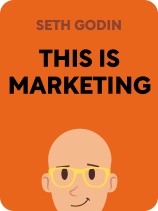

This article is an excerpt from the Shortform book guide to "This Is Marketing" by Seth Godin. Shortform has the world's best summaries and analyses of books you should be reading.
Like this article? Sign up for a free trial here.
Are you wasting resources trying to reach people who aren’t interested in what you have to sell? How is permission marketing different from traditional marketing?
In This Is Marketing, entrepreneur and marketing expert Seth Godin challenges conventional marketing strategies. He argues that, in today’s media-saturated world, traditional marketing techniques are no longer effective.
Read on to understand the definition of permission marketing and why Godin thinks it’s preferable to older methods.
The Definition of Permission Marketing
According to Godin, traditional marketing (what he calls interruption marketing) no longer works because it relies on competing for consumers’ attention by spamming them with ads. He argues that in today’s media-saturated landscape, people’s attention has become more valuable because they have so many options to choose from. When people are constantly bombarded by advertisements, they become better at tuning out what doesn’t interest them. In short, he suggests, you can’t trick people into wanting what you’re selling by being the loudest or the biggest. People can just ignore you.
Instead, Godin advocates for what he calls “permission marketing.” The definition of permission marketing is intentional marketing to a group of people who want to hear what you have to say.
(Shortform note: Some marketers counter that traditional marketing strategies aren’t obsolete, arguing that traditional marketing platforms, such as newspaper ads and direct mail, still yield effective results and a favorable return on investment (ROI). According to one study, consumers place higher trust in newspaper ads compared to search engine ads, and another study found that direct mail consistently outperformed email, paid search, and social media in response rate. Furthermore, there has been a notable increase in viewership for broadcast and cable television in recent years. Instead of throwing out old strategies, some marketers suggest conducting experiments with various platforms helps identify the strategies that yield the highest ROI.)
He argues that good marketers consider who they are trying to serve and what they need, and then work diligently to meet that need. With this strategy, marketing is a practice of empathy rather than manipulation and becomes about making a positive change in people’s lives—a change they actually want.
(Shortform note: Feminist author and cultural critic bell hooks argues in her 1999 book, All About Love, that rather than being a practice of empathy, marketing uses deception to perpetuate a constant state of desire and dissatisfaction that fuels the marketplace economy. Godin doesn’t dispute the role of lying in marketing. In All Marketers Are Liars, Godin acknowledges that lying is a part of the job, but he qualifies that good marketers only tell “fibs”—stories that may not be 100% factual or based in reality but bend the truth in a way that benefits both the business and the customer.)
According to Godin, there’s no step-by-step method for effective marketing. Instead, he offers a set of guiding principles: Create something of value, focus on your core audience, match your story to their point of view, capitalize on the power of word of mouth, and be consistent.
Exercise: Reflect on Permission Marketing
Godin argues that traditional marketing techniques are ineffective, advocating instead for what he calls permission marketing—intentional marketing to a group of people who want to hear what you have to say.
- Consider your email inbox. What is an example of a marketing email that you get that’s ineffective? What makes it ineffective?
- What is an example of a marketing email that you’re excited to see in your inbox? What makes it different from other marketing emails?

———End of Preview———
Like what you just read? Read the rest of the world's best book summary and analysis of Seth Godin's "This Is Marketing" at Shortform.
Here's what you'll find in our full This Is Marketing summary:
- Why traditional marketing strategies are no longer effective
- Why you should aim to build trust, authenticity, and empathy with customers
- Guiding principles for successful marketing in the modern age






